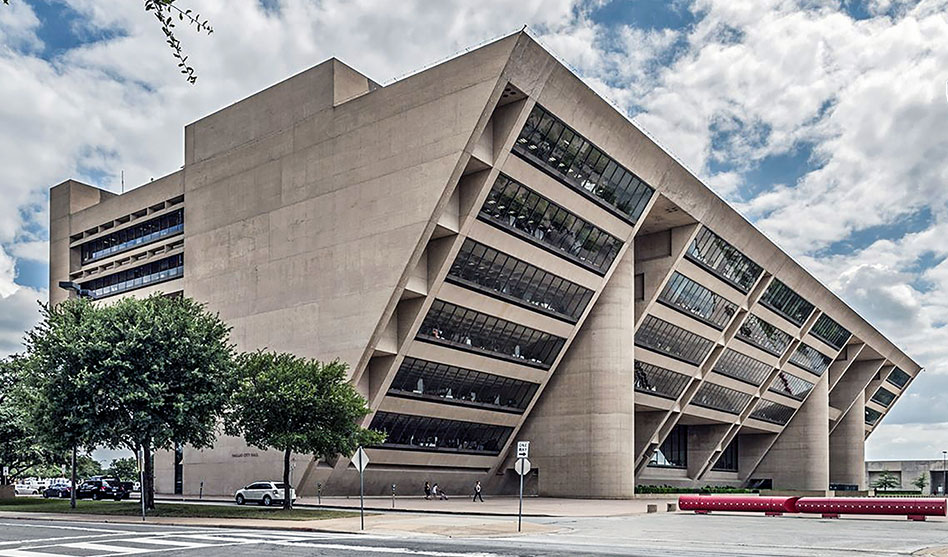Dallas City Hall
Three charter amendments were written by a right-wing PAC. The others were proposed by the city council
 The document on the Dallas City Hall website explaining this year’s extensive list of charter amendments is 32 pages long. No one except a reporter with nothing else to do is going to read that. So I did.
The document on the Dallas City Hall website explaining this year’s extensive list of charter amendments is 32 pages long. No one except a reporter with nothing else to do is going to read that. So I did.
A couple of the proposals are controversial. Some are just changes in wording to comply with state law.
Proposals B through R were written by city staff and approved for the ballot by the city council. The last three — S, T and U, also known as the MAGA propositions — were not. Here is some information on those three proposals.
The MAGA Amendments
• Proposition S
Proposition S would give any Dallas resident standing to sue the city for just about anything related to the city charter, a city ordinance or any state law. City government would come to a standstill defending itself against hundreds, maybe thousands, of frivolous lawsuits. And it would cost each and every Dallas city resident a fortune.
• Proposition T
If Proposition T were to pass, the city would be compelled to conduct an annual survey of just 1,400 residents to determine whether the city manager should be fired or given up to a 100 percent raise.
I like our current interim city manager, Kimberly Bizor Tolbert. I think she’s doing a good job and she’s delightful to talk to. But I am in no way qualified to judge her actual job performance. Neither is the average Dallas resident who probably never has met her.
She works daily with the mayor, council and city staff. They should decide her employment fate.
• Proposition U
This proposal would fund the police and fire pension. Sounds good. It also increases starting pay. OK.
And then it requires an increase in staffing to 4,000 officers. Impossible.
Currently, DPD has about 3,000 officers. New qualified recruits are hired every day, but others retire and resign.
One of the priorities of our new police chief, whomever that will be, is recruiting new officers. But requiring a particular number in the city charter is ridiculous and something that will be impossible to fulfill. That will just lead to more turmoil and turnover.
 The only way to keep within the law if Prop U passes is for the police department to hire hundreds of unqualified police officers each year. The police department doesn’t want that. I doubt you want that.
The only way to keep within the law if Prop U passes is for the police department to hire hundreds of unqualified police officers each year. The police department doesn’t want that. I doubt you want that.
City proposals
Here’s a guide to the rest of the amendments and changes to the city charter. Most seem like sensible updates, but if you object to any, vote no on those particular proposals.
• Proposition B
This proposition would add a preamble to the city charter that declares the city to be an “equitable democracy, comprised of representatives that act to make the city fair, equitable, just, and safe for all residents.”
• Proposition C
This proposal would increase the salary of city council members to $90,000 and mayor to $110,000 annually. The amount would increase each year by an amount tied to the local consumer price index.
Currently city council members are paid $50,000 a year and the mayor is paid $80,000 a year. About half the council members currently maintain outside employment in order to be able to serve.
This is probably the most controversial proposal and least likely to pass. The argument for passing it is if we want effective local government, we’ve got to pay for it.
• Proposition D
Remove the election date from the charter. This would allow Dallas to hold local elections in November — one less time to go to the polls each year. Houston and Austin moved their election day to November and turnout increased.
• Proposition E
We have term limits for the office of mayor and city council — two four-year terms for mayor and four two-year terms for city council. But after sitting out a term, these former officials may run again.
This proposition would prevent officials from running for the same office again after serving their eight years.
• Proposition F
Provide the city secretary and city auditor with employees.
This one is more technical than a real change. Currently, both positions are provided assistants. Under this change they’d be allowed assistants and employees as needed.
• Proposition G
Add eligibility requirements to serving on the redistricting commission.
Spouses, children or parents of current city council members or mayor couldn’t be appointed to do city redistricting. Neither could their campaign managers or treasurers. Nor could registered lobbyists nor county, state nor federal elected officials.
• Proposition H
This one would eliminate the requirement that to be appointed to a board or commission, a Dallas resident would be required to be registered to vote, a qualified voter or a qualified taxpaying citizen. The requirement to serve would be that the person is a Dallas resident.
• Proposition I
Amend the rules of initiative and referendum petition procedures. The amount of time allowed to collect signatures would be extended from 60 to 120 days. The number of signatures that would be required to make the ballot would be reduced from 10 percent to 5 percent of qualified voters.
In other words, this amendment would make it easier to bring a city referendum to a vote.
• Proposition J
This one would allow the city council to replace a board or commission member before the end of their term by a majority vote.
Dallas residents serve on boards and commissions without compensation. Sometimes attendance is a problem, and, when that happens, a district isn’t getting the representation it deserves. Sometimes a board member is just difficult to work with.
It’s rare that board and commission members need to be removed, but this gives the council that ability.
• Proposition L
Dallas added the position of inspector general, which is “an independent investigative authority that assumes the primary responsibility of identifying, investigating and resolving ethical issues within the city.”
This proposal would add the position to the city charter along with the duties.
• Proposition O
This proposition clarifies the appointment procedure for associate municipal judges. These city judges would be appointed by the city council, must be residents for at least four months before the date of appointment and must be practicing attorneys in good standing.
• Proposition P
When city employees are discharged or reduced in pay grade, they may appeal to an administrative law judge. Currently, they have to pay half the cost. This proposition would eliminate that cost to the employee.
• Proposition Q
This is another technical proposition that changes wording in the charter to comply with state law. In several places the word “compensation” changes to “salary,” and “citizens” changes to “residents.” In another place, a requirement that a person has lived in Dallas six months is changed to “resided continuously.”
Several items in the proposition require the city to publish certain pieces of financial information in a newspaper of record and wait two weeks before acting on those items. That information is currently posted online, but those provisions would be removed, if the proposition passes.
• Proposition R
They saved the best for last: Marijuana enforcement. The city can’t legalize marijuana, but it can decide who to arrest and prosecute.
This amendment would prohibit the Dallas Police Department from making arrests or issuing citations for marijuana possession or considering the odor of marijuana as probable cause for search or seizure. The major exception would be as part of a violent felony or high priority narcotics felony investigation.
Prop R would make Class A (possession of two to four ounces) and Class B (possession up to two ounces) misdemeanors the police department’s lowest priority. City funds and personnel couldn’t be used to determine whether a substance meets the legal definition of marijuana, except in limited circumstances.
There is no Proposition A, K, M or N.

